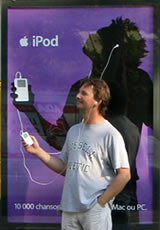
I've determined that I have exactly three friends in San Francisco that I can talk politics with. Three out of a hundred or so other acquaintances and people I see on a regular basis. When a big anti-war demo takes place that number increases to seven. But on an average day, I'm discussing the issues of the day with myself (in my head) or with clued-in European friends via email . The Brits and Germans I chat with get the impact of their our government (and theirs) on peoples lives, plus they level as much critique on their local city councils as on GWB. Amongst my circle, even if they even know who their District Supervisor is, my friends would rather not talk about international political or class issues. They don't do politics
John Bolton, the war in Colombia, the war in Iraq, global warming, drilling in Alaska or the increasing rates of poverty in the US? I might as well be talking about anal fungi or the Paleozoic Era.
In general, the most common response I get from friends regarding their lack of political interest: A) they feel completely powerless, so why bother and B) the news is a total bummer, or some variation of "I can't watch CNN, it depresses me/I don't read the paper I get too emotional."
A Washington Post report last week showed that only about 30 percent of people in their 30s read newspapers, and even fewer in the 18-29 demo. Of course that doesn't account for the increase in online news sourcing, but still, the residual effects are pretty apparent in how young people avoid politics like STDs or the police. There's an interesting commentary about the subject that shows, basically, free periodicals (like Vice) are getting it. In other words, people want their news free and dumb.
The other night I DJed at an AlterNet book release party for Start Making Sense: Turning The Lessons of Election 2004 Into Winning Progressive Politics. In a capacity crowd of some 350, the number of people under 30 in the audience = 10. Number of the five panelists being questioned on the book's topic under 30 = 0. Number of times after the panal discussion that I was asked by older audience members to turn the music down = 4. Of the panelists only Oakland environmental/prison activist Van Jones had anything of interest to say to the iPod crowd (i.e. the youth), or, for that matter, the boys in white shirts on the corner.
As far as I can see, the free market acts like a pacifier in the mouths of young adults. From their perspective, as long as you make enough to consume and keep a roof over your head, the rest of the world can sort itself out. But can I blame them really? Capitalism ensures that the majority of young people are too tired working low-wage jobs trying to make ends meet and cover for their lack of health and education safety nets. Even friends in upper income brackets are chronically overwhelmed by the "big issues" (as if emailing one Congressman or woman would kill them).
I'm not pointing fingers, just lamenting that people have become so disenchanted with the greater world around them, even as globalization brings it closer to their doorsteps and dinner tables evey day. But I suppose its okay that my friends don't do politics. Hell, not even former Director of Homeland Security Tom Ridge does them:
Question: Mr. Secretary, there are a lot of New Yorkers that are skeptical about these kinds of threat alarms and some even see a political motive in all of this. What can you say to those New Yorkers to dissuade them from thinking that?
Secretary Ridge: We don't do politics in the Department of Homeland Security. Our job is to identify the threat, match that threat information with the, potentially, the targets that have been identified to integrate an entire country, to build partnerships with the state and local government, to invest in technologies so that as we combat international terrorism we can put more people and technology in place to make ourselves safer.
----Apparently, what Tom Ridge DOES do, is run-on sentences.----
